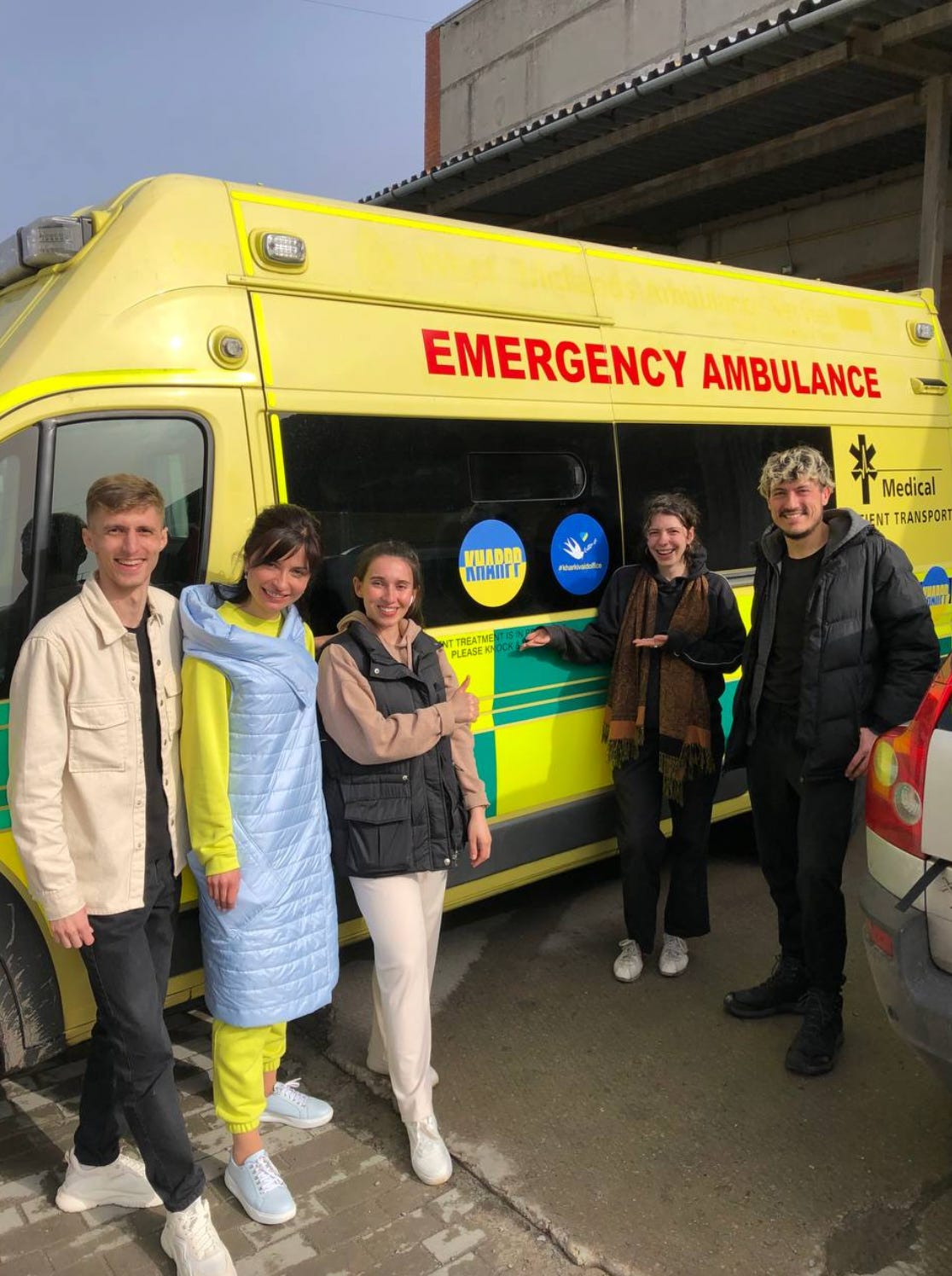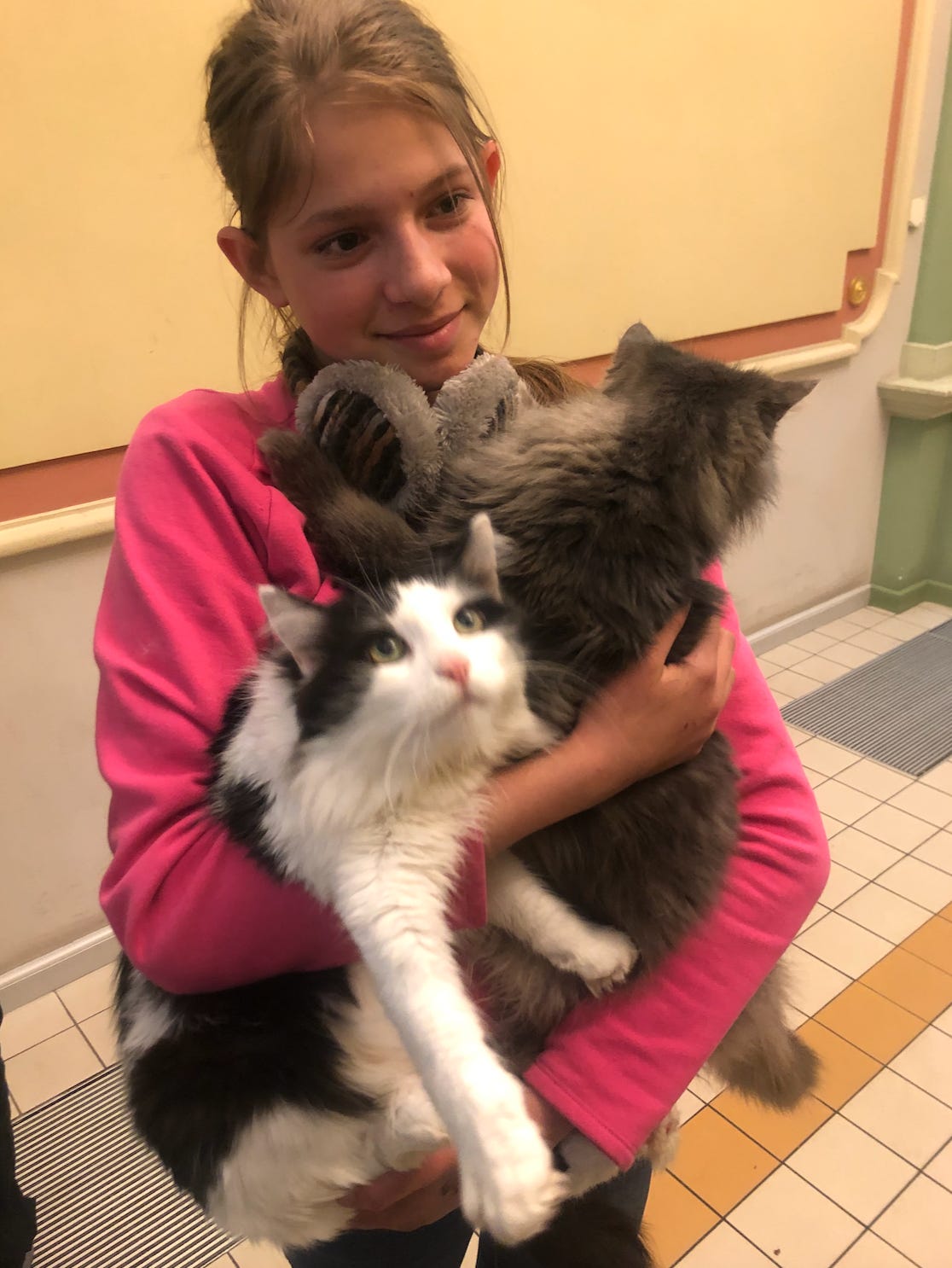I am writing this update as I make the journey back home to the UK, where I am going to complete my Masters. Alex will return at the end of the week, and we will be leaving the on the ground running of KHARPP to a variety of volunteers until we get back.
The past week has been a logistics heavy one on our end, culminating in the delivery of an ambulance to Lviv yesterday afternoon. It’s a testament to the power of social media that this ambulance found its way to us – via someone I met on Twitter being contacted by someone else on Twitter. The ambulance was driven to Krakow, where we met it. We took it back to Przemyśl where we filled it with as much food as it could hold, and then drove it across the border to Lviv. After working with our friends at the Kharkiv Aid Office for six weeks, meeting them in real life to hand over the ambulance was really wonderful. It was also a powerful reminder of our position in all of this; after having dinner, we drove back to the border to our comfortable, safe Airbnb in Poland. They drove back to Kharkiv, where already today there have been several reported deaths from shelling.
The city is now inhabited almost exclusively by the poor, elderly, and disabled – all those who could not leave. The young people who have stayed to help them, risking their own lives every day to do so, are some of the bravest people imaginable, and it is a really honour that we are able to work with them and provide them with the help they need.
On the Przemyśl end, the flow of people coming from Ukraine seems to be decreasing, though it’s hard to accurately guess whether this is as a result of Orthodox Easter, or a real decrease. There were reports of massive queues re-entering Ukraine earlier in the weekend – though again, the reasons for this are multifaceted. A few hypotheticals: people returning for Easter, people taking advantage of the dropping of import tax on cars; the general trend of return simply continuing.
Those who do come continue to be victims of extreme levels of trauma. A few days ago, I met a family from Irpin – two sisters and their teenage daughters. I won’t repeat the specifics of the things they told me that they had seen – but it will continue to haunt me. They described it as hell on earth. We got them a hotel room, some dinner, and a flight to Ireland for the next day, where a family member who left at the start of the war was waiting for them.
As the war continues, our work is morphing into providing long term support for those who have left. Families I met weeks ago call me daily with a variety of problems in their new countries. Some of these are easy enough to deal with – asking the best route to get from A to B. Others are really difficult. I met one woman from Kyiv about a month ago, who had travelled through with her five-year-old daughter. Immediately after getting off the train, she already regretted her decision and wanted to go back. I managed to persuade her to spend the night in Przemyśl, and the next day she got the train to Germany. In Germany, they were put into a camp where her daughter got ill as a result of poor heating. I got them out of the camp and into a room in a house, but her daughter still hasn’t fully recovered. She has, for some reason, been unable to access any benefits in Germany, and they continue to eat every meal at the train station.
I am also in contact with a pair of babushki from Kharkiv, who got to Germany at about the same time as the mother and daughter. They are still in camps, having been moved around several times. ‘Its cold here’, they write to me, ‘and it’s too noisy. We haven’t slept since we arrived.’ They haven’t met a single Russian or Ukrainian speaking volunteer in Germany, and don’t own smartphones and so cannot use Google Translate. They are considering coming back into Poland to try and find something better here. I’ve told them that they’d be better off going further west – to France or Belgium, or maybe to Scandinavia.
Positive news also seeps through the barrage of problems. A family from Dnipro we bought to Ireland for weeks ago are now living in a house – ‘more a palace than a house!’, they texted me yesterday. They put us in touch with friends of theirs, who are also now in Ireland. A week ago, in my last newsletter, I wrote that the women and children sheltering under Azov Steelworks in Mariupol would be dead in a week. At the time of writing, this is not the case, and the defenders of the city continue to fight on.
Being in the UK does not mean that our work stops. Whilst it is a barrier to what we are doing, we will continue to work with the – at this point, hundreds of – families we are already in contact with, supporting them long term. KHARPP volunteers will keep working at the station, providing the on-the-ground support necessary. We will keep organising for food, medicine, and other essentials to be sent to Kharkiv every week.
Thank you all so much for all of your support.
As always, Slava Ukraini!
the arrival of our (kh)ambulance in Lviv.
a Kharkivite babusja receives her food and medication.
a girl from Dnipro with two of her four amazing cats she travelled with.







Did you get to purchase any of the ambulances in the UK? How much do they cost and who is supplying them? sensiblefolks@aol.com